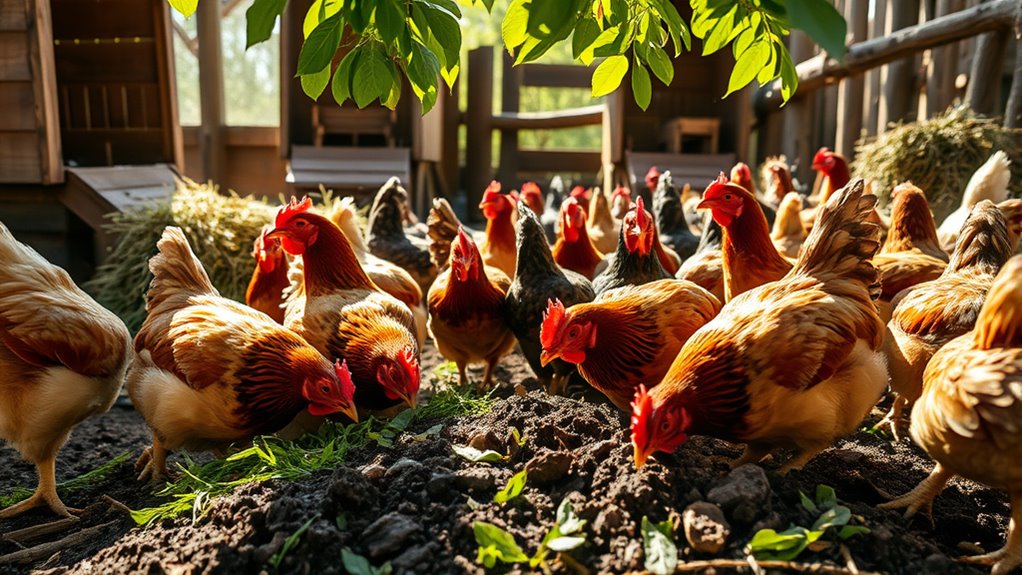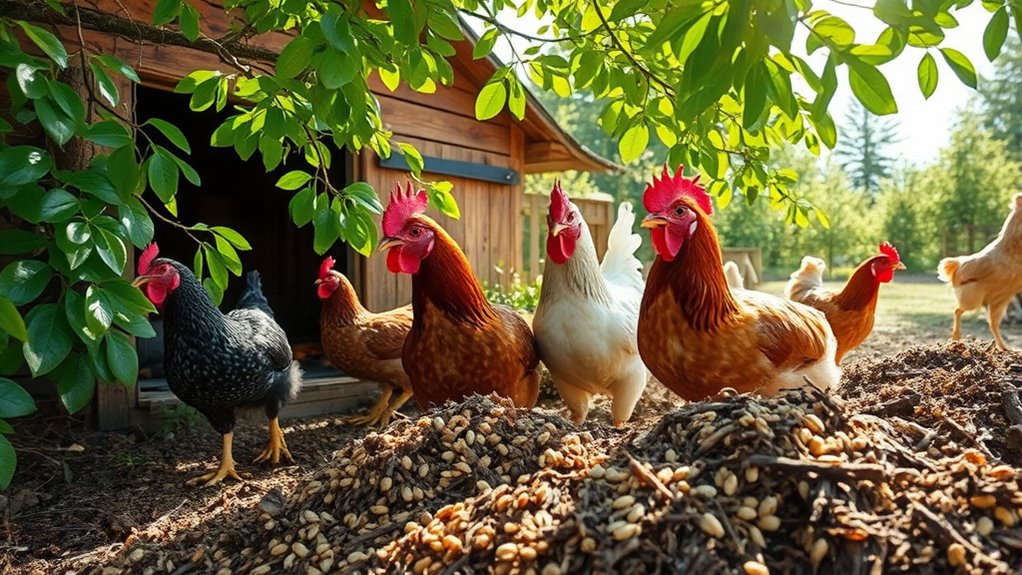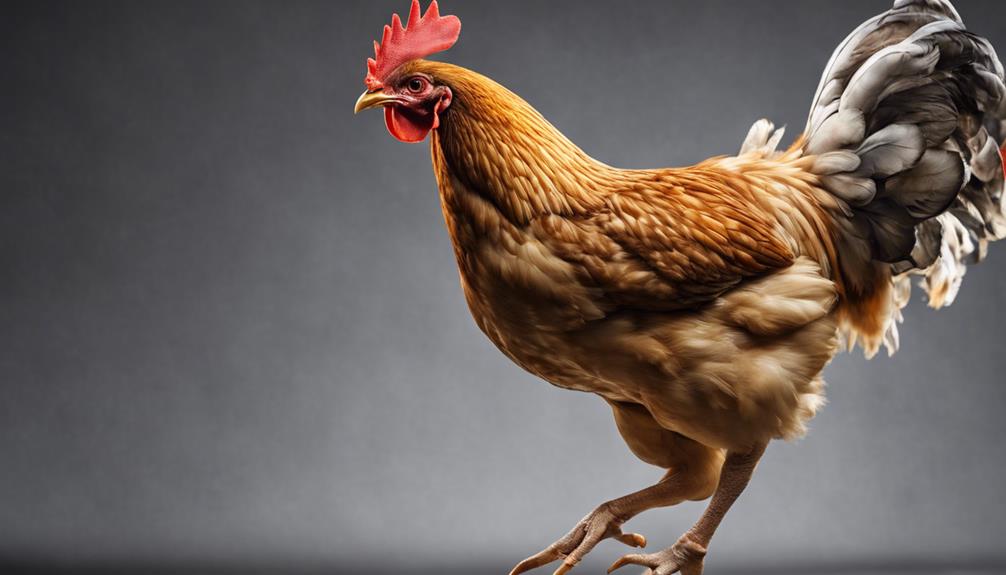By incorporating chickens into your compost, you can boost the breakdown process by up to 30%. Chickens help by aerating the pile through pecking and scratching, which increases oxygen flow and speeds up decomposition. Their manure adds nitrogen, fueling microbial activity, while their activity prevents compacting and odors. Regularly adding organic waste and letting your chickens mix and fertilize the compost creates richer, faster compost. Keep exploring to discover simple ways to maximize these benefits in your DIY setup.
Key Takeaways
- Chickens aerate compost through scratching and pecking, increasing oxygen flow and speeding up decomposition by 30%.
- Their manure adds nitrogen-rich material, boosting microbial activity and accelerating compost breakdown.
- Chickens help break up compacted materials, enhancing airflow and reducing composting time.
- Regular chicken activity prevents anaerobic conditions, ensuring faster and more efficient composting.
- Positioning the coop near the compost area allows easy manure transfer, promoting continuous compost acceleration.

Adding chickens to your compost pile can considerably speed up the process, helping it break down 30% faster than traditional methods. One of the main reasons for this boost is chicken manure, which acts as a powerful natural fertilizer and compost accelerant. When chickens forage and scratch through your compost, they not only aerate the pile but also introduce fresh, nitrogen-rich waste that accelerates microbial activity. This synergy between chicken manure and organic waste creates ideal conditions for faster decomposition, reducing the usual wait time for nutrient-rich compost.
Integrating chickens into your composting routine is straightforward. As they peck and scratch, they break up compacted materials, increasing airflow and promoting even decomposition. This process prevents the pile from becoming anaerobic, which can slow down or stall composting altogether. The presence of chicken manure adds a crucial nitrogen component, balancing the carbon-heavy materials like dry leaves or straw. This balance is critical for compost acceleration, as it ensures microbes have the necessary nutrients to thrive and expedite the breakdown process.
Pecking and scratching aerate compost, speeding decomposition and preventing anaerobic buildup.
Keep in mind, however, that chicken manure is high in nitrogen, so it’s best to mix it well with carbon-rich materials to prevent odors and over-accumulation of nitrogen. Using a variety of organic waste—kitchen scraps, yard waste, and bedding materials—alongside chicken manure ensures a healthy, balanced compost. When chickens are actively involved, their constant disturbance of the pile leads to more uniform decomposition and quicker results, often producing usable compost in a shorter time frame.
Another benefit of having chickens around is that they help control pests and weeds by turning over the compost and consuming unwanted pests or seeds that might otherwise take root. Their natural foraging reduces the need for additional aeration or turning, making the process more efficient. Plus, as they deposit manure directly into the compost, they provide a continuous source of nutrients without any extra effort on your part.
To maximize compost acceleration, guarantee your chicken coop is positioned near your compost area, allowing easy transfer of manure and scraps. Regularly add fresh bedding and kitchen waste, and let your chickens do what they do best—till, fertilize, and add organic matter—all contributing to faster, richer compost. With this setup, you’re not only recycling waste efficiently but also creating a nutrient-dense soil amendment that will boost your garden’s health. Incorporating chickens into your composting routine is a simple, effective way to speed up the process while enriching your soil naturally.
Frequently Asked Questions
Can Any Chicken Breed Improve Composting Speed?
Not all chicken breeds boost composting speed equally. Your choice of chicken breed selection can influence how quickly your compost breaks down because some breeds are more active and produce more manure. Incorporate coop design tips that encourage these energetic breeds to move around and aerate the compost. By choosing the right breed and designing your coop thoughtfully, you can markedly speed up composting, making your garden healthier and more sustainable.
How Many Chickens Are Optimal for Compost Acceleration?
You should aim for about 3 to 6 chickens to optimize compost acceleration. Different chicken breeds, especially those that are foragers or have high activity levels, can boost composting speed. Additionally, making diet modifications by including kitchen scraps or high-nitrogen feeds can enhance their digestion. With the right number and breed, plus smart diet tweaks, you’ll see compost break down faster, speeding up your gardening process.
Do Chickens Require Special Diet Adjustments for Composting?
Ever wonder if your chickens need special diets for better composting benefits? The answer is yes—what they eat impacts compost speed and quality. Providing a balanced chicken nutrition guarantees healthy birds and accelerates compost breakdown. Avoid excessive grains or processed foods, which can harm your compost. Instead, offer veggie scraps, grains, and occasional treats. This simple adjustment maximizes composting benefits and keeps your flock thriving, all while transforming waste into rich compost faster.
How Do Seasonal Changes Affect Chicken-Assisted Composting?
Seasonal changes impact chicken-assisted composting by altering temperature and daylight hours. In colder months, lower temperatures slow down decomposition, so your chickens’ activity may decrease, reducing compost speed. Shorter daylight hours also limit their time outside, affecting manure collection. To maintain compost efficiency year-round, adjust your compost layers, provide extra bedding, and make certain chickens stay comfortable during winter, helping them continue to boost composting even in seasonal shifts.
Are There Risks of Odors or Pests With Chickens in Compost?
You might worry about odors or pests when keeping chickens in compost, but with proper odor control and pest prevention measures, you can avoid these issues. Make sure to balance green and brown materials, avoid overfeeding chickens, and keep the coop clean. Using bedding that absorbs moisture and installing predator-proof fencing also helps prevent pests. Regular maintenance guarantees your compost stays odor-free and pest-resistant, making your chicken-assisted composting both safe and effective.
Conclusion
By welcoming chickens into your compost routine, you’re gently inviting nature’s helpers to do their magic, making your composting journey smoother and more efficient. With their natural habits, they subtly speed up the process, giving your garden that extra boost it craves. Embrace these feathered friends and enjoy the quiet harmony they bring, turning what once was a slow chore into a lively, rewarding dance with nature. Your garden will thank you for the subtle, yet powerful, boost.









